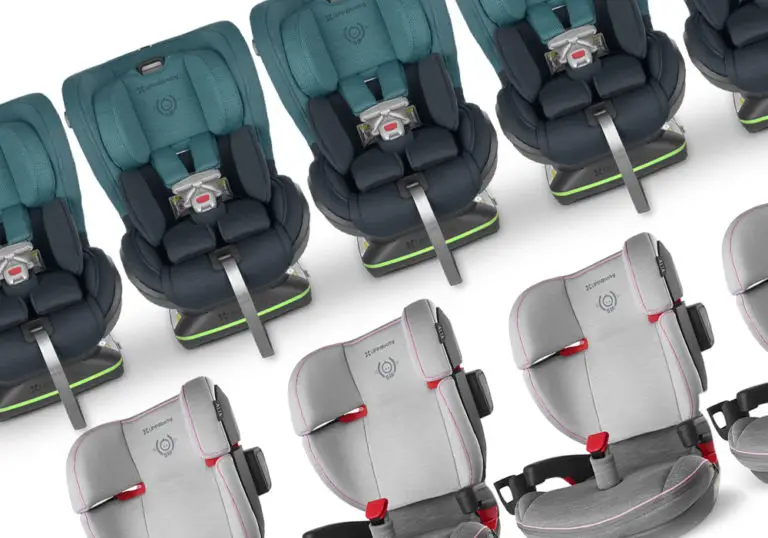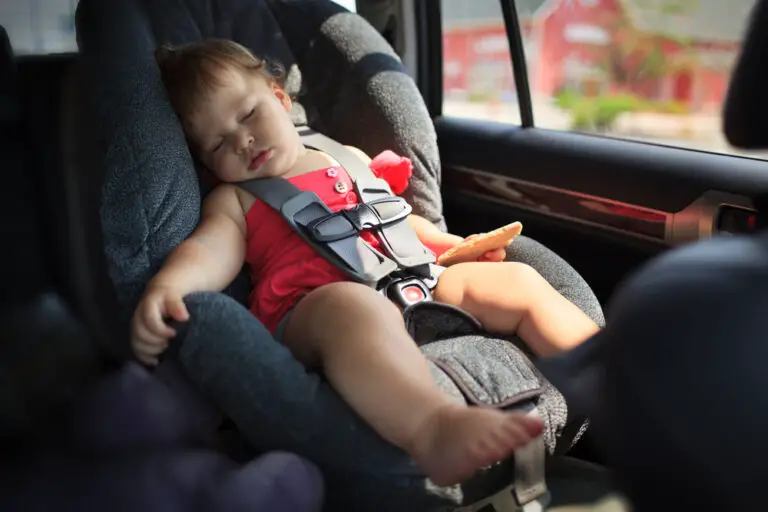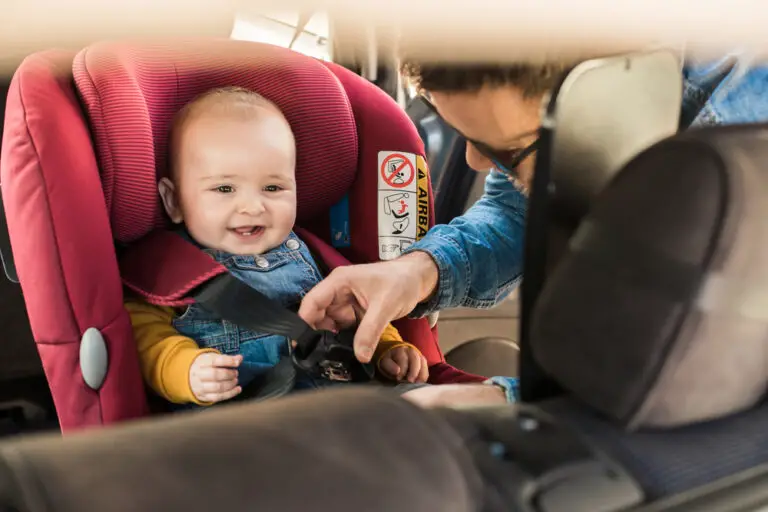Nebraska Car Seat Laws 2024 (Rear, Forward & Booster)

Under Nebraska car seat laws, all children up to the age of 8 years must be secured in an appropriate child restraint. Children up to 2 years old should ride in a rear-facing seat, while older kids should ride in a forward-facing or booster seat. There is a $25 fine for violating the law.
Disclaimer: This content does not constitute legal advice. It is solely for informational purposes. Always check the original source of the law for the latest version.
- Rear-Facing
- Forward-Facing
- Booster
- Front Seat
- Seat Belt
- Taxi Seat
- Ridesharing Seat
- Replacement
- Alone in Car
- Choosing a Seat
- Installation Help
Nebraska Car Seat Laws
Nebraska Rear-Facing Car Seat Law
According to the rear-facing car seat law in Nebraska, all children up to the age of 2 years must ride in an infant rear-facing seat. (1)
It must be placed in the backseat if the vehicle has one. Make sure never to place a rear-facing seat in front of an active airbag.
The rear-facing car seat age in Nebraska is 2 years. But children should remain in this seat till they outgrow the maximum limits prescribed by its manufacturer.
This requirement does not apply to a child who, in the opinion of a licensed physician, cannot use a rear-facing car restraint due to a physical or medical reason.
The driver of the motor vehicle is responsible for complying with Nebraska rear-facing child seat law. A violation is considered an infraction and carries a fine of $25. (2)
Age: Newborn to 2 years
Penalty: $25
Nebraska Forward-Facing Car Seat Law
There is no specific forward-facing car seat law in Nebraska. As per the car seat laws in Nebraska, children up to the age of 8 years have to be restrained in a car seat. (1)
Those who have outgrown their rear-facing seats should be secured in a forward-facing seat with a harness. Since there is no formal Nebraska forward-facing child seat law, the forward-facing car seat age in Nebraska is also absent.
However, you should follow the recommendations of the National Highway Traffic Safety Administration (NHTSA).
Keep your child in a forward-facing seat till they reach its maximum height and weight limits as prescribed by the manufacturer.
Violating the law carries a penalty of $25. (2) The driver of the motor vehicle will be held responsible for the infraction.
Age: Up to 8 years
Penalty: $25
Nebraska Booster Seat Law
There is no definite child booster seat law in Nebraska. However, child seat requirements in Nebraska require all children up to 8 years of age to ride in a car seat. (1)
The booster seat age in Nebraska is not prescribed, but once your child has outgrown the upper height and weight limits of a forward-facing seat, they can start riding in a booster seat.
They should continue using a booster seat till they are big enough for the seat belt. A seat belt fits properly when the lap belt lies snuggly across the upper thighs and the shoulder belt lies perfectly across the shoulder and chest.
You can choose either a high-back or backless booster seat, depending on your vehicle. There is a fine of $25 for violating Nebraska booster seat requirements.
Age: Up to 8 years
Penalty: $25
Nebraska Child Front Seat Law
According to the child front seat law in Nebraska, all children under the age of 8 years must ride in the backseat. (1)
If the vehicle does not have a backseat or all places in the backseat are occupied by children less than 8 years old, then a child can ride in the front seat.
The front seat age in Nebraska is 8 years and older. However, Nebraska State Patrol recommends that a child who is less than 12 years old should ride in the backseat.
If absolutely necessary, you can put your child in the front seat after following certain requirements. In the case of a rear-facing seat, the passenger-side airbag must be deactivated.
The child’s car seat must be appropriate for their height and weight. The vehicle seat must be pushed as far back from the airbag as possible.
Age: Above 8 years
Penalty: $25
Nebraska Child Seat Belt Law
According to the child seat belt law in Nebraska, all children between the ages of 8 to 18 years should wear an adult safety belt. (1) They have to wear it in the backseat as well as the front seat.
Seat belt rules in Nebraska do not apply to a vehicle manufactured in or before 1963 that is not equipped with seat belts. Authorized emergency vehicles, when on duty, are also exempt from these requirements.
If your child has a physical or medical condition that does not allow them to wear a seat belt, you will not be ticketed if they are not wearing a seat belt. But you must carry a written statement from a licensed physician.
A violation of Nebraska children’s seat belt law carries a fine of $25. (2)
Age: 8 to 18 years
Penalty: $25
Nebraska Taxi Child Seat Law
According to the taxi child seat law in Nebraska, taxis are not required to have a child passenger safety system in place. (1) The driver is not responsible for providing a car seat.
However, as parents and caregivers, it is best if you arrange an appropriate taxi child seat in Nebraska. If your child is less than 2 years old, you must secure them in a rear-facing seat as per Nebraska child seat laws.
Once they outgrow it, they can move to a forward-facing seat and then to a belt-positioning booster seat.
When installing the car seat in a taxi, it is your responsibility as a caregiver to ensure that it is securely fixed. You can refer to the car seat manual for proper installation.
Nebraska Ridesharing Child Seat Law
There is no clear ridesharing child seat law in Nebraska.
Nebraska state law requires all children up to the age of 8 years to ride in a car seat. (1) the driver of the motor vehicle has to ensure that they are safely buckled up.
However, the law does not state if it applies to rideshare services such as Uber or Lyft. Nor does it say if the driver should provide a child seat.
To avoid violating the law, it is best for either the driver or the parents/caregivers to provide a car seat. If you are a caregiver, then you should inquire with the driver first before boarding the rideshare vehicle.
It is best to carry your own car seat. If you are a driver, you can have an all-in-one seat.
Nebraska Child Seat Replacement Law
There is no definite child seat replacement law in Nebraska.
The NHTSA recommends replacing a child safety seat after an accident in Nebraska. In case of a moderate or severe crash, you should immediately replace the seat.
But if it is a low-impact accident, there is no urgent need to replace the car seat.
A low-impact crash is where no passenger is injured, the door nearest to the car seat is not damaged and the seat itself shows no visible damage.
Apart from child seat replacement after an accident, you must also replace the seat after it has surpassed the expiration date prescribed by the manufacturer.
Most seats need to be replaced after 6 years. Another time to replace your car seat is if it has been recalled.
Leaving Child in the Car in Nebraska
According to the law on leaving a child in a vehicle in Nebraska, it is illegal to leave a child who is 6 years of age or younger unattended in a motor vehicle. (3) It amounts to child abuse or neglect.
Leaving a child unattended in a vehicle may lead to heat stroke. The temperature inside the vehicle can rise rapidly. Since children’s bodies heat up faster than adults, they are at great risk of suffering a heat stroke.
The child may suffer other risks, such as setting the car in motion or having some other in-car accident.
Leaving a child in the car in Nebraska is a misdemeanor if done negligently and does not harm the child. But if it results in serious harm or death of the child or is committed knowingly, it is classified as a felony. (4)
Choosing a Child Car Seat in Nebraska
When choosing a car seat in Nebraska, ensure that you adhere to Nebraska car seat regulations.
From the time your child is born till they turn at least 2 years old, a rear-facing car seat is the best car seat to use in Nebraska. They can then move to a forward-facing seat with a harness and teether.
After they reach the maximum height and weight limits of the forward-facing seat, they should use a belt-positioning booster seat.
The best booster seat to use in Nebraska is one that props your child up to allow the seat belt to fit perfectly across their lap and shoulders.
Car Seat Installation Help in Nebraska
Installing a car seat can be a tedious task, especially if you are doing it for the first time. The seat must be secured perfectly as per the manufacturer’s instructions to ensure the safety of your child.
To help you with child passenger safety seats in Nebraska, the state has different stations with certified Child Passenger Safety (CPS) technicians.
You can get your car seat checked or installed and also learn more about child passenger safety. Some of them are:
- Chadron Community Hospital
- Complete Children’s Health
- CHI Health St. Francis Child Safety Program
- Three Rivers Public Health Department
- Boone County Health Center
Nebraska Car Seat Safety Resources
- Nebraska State Patrol
- Children’s Hospital and Medical Center: It contains a comprehensive list of best practices to be followed with each type of car seat.
- Methodist Health System: It is a leading health system with multiple hospitals in Nebraska and a number of healthcare providers and support services. It contains a vital pool of resources that inform you about all types of car seats and how to ensure that your child is always protected.
- Safe Kids Nebraska: Parents and caregivers can refer to SafeKids Nebraska for a complete guide on car seat safety and inspection stations to get them checked.
FAQ
How long should a child ride in a rear-facing car seat in Nebraska?
Under the law, a child should ride in a rear-facing car seat till the age of 2 years or till they outgrow the maximum limits of the rear-facing seat.
Can you put a rear-facing car seat in the front seat in Nebraska?
No, you cannot put a rear-facing car seat in the front seat in Nebraska. If you do put it in front, the front seat airbag must be deactivated.
Can you put a rear-facing car seat in the middle rear seat in Nebraska?
You can put a rear-facing car seat in the middle rear seat if your vehicle has lower anchors in the middle. Check your vehicle and car seat manuals.
When can a baby face forward in a car seat in Nebraska?
A baby can face forward after they have outgrown the limits of their rear-facing seat. This typically happens around 2 years of age but may take longer.
How old for a booster seat in Nebraska?
There is no definite age. But children younger than 8 years who have outgrown their forward-facing seats should ride in a booster seat.
When to use a backless booster seat in Nebraska?
You can use a backless booster seat if your vehicle seat has a headrest and the child’s ears are not higher than the seat back.
When can a child sit in the front seat with a booster in Nebraska?
A child can ride in the front seat with a booster if all positions in the backseat are occupied by children under 8 years of age.
When can a child stop using a booster seat in Nebraska?
Under the law, a child can stop using a booster seat when they turn 8 years old. But they should only stop using a booster seat once the seat belt fits them properly.
When can a child sit in the front seat in Nebraska?
A child can sit in the front seat after they turn 8 years old. However, they should ideally ride in the backseat till the age of 12 years.
When to switch from 5 point harness to a seat belt in Nebraska?
When the child outgrows the height and weight limits of the 5-point harness, they can switch to wearing a seat belt in a booster seat.
When can a child use a regular seat belt in Nebraska?
Under the law, a child can start using a regular seat belt once they are 8 years old. However, they should wear a seat belt only when it fits them properly.
Do you need a car seat in a taxi in Nebraska?
Taxis are not required to have a car seat. However, it is recommended that you carry an appropriate car seat for maximum protection of your child.
Do you need a car seat in a Uber in Nebraska?
The law is unclear on this subject. But either the parent/caregiver or the driver should provide a federally approved and appropriate car seat for the child.
Do you need a car seat in a Lyft in Nebraska?
The law is not clear on this issue. But either the caregiver or the driver should provide an appropriate car seat to ensure the child’s safety.

Rishima Rawat
Rishima Rawat is a lawyer and legal writer with over six years of writing and legal experience. She earned her LLB degree from the West Bengal National University of Juridical Sciences, Kolkata. With a passion for child safety, she’s written extensively about the U.S. car seat laws in ParentingMode. She collaborates with businesses and law firms globally, enhancing their online content. Her insights are also published in legal journals like RGNUL, NLIU, and RMLNLU Law Review. Committed to the cause of education, she has volunteered with IDIA, which helps underprivileged children in India to access legal education. She has also worked with Enhelion Knowledge Ventures, a leading legal ed-tech platform in India that provides students with affordable courses in law. Fluent in English and Hindi with elementary proficiency in Spanish, Rishima combines her legal expertise with a dedication to child safety.






